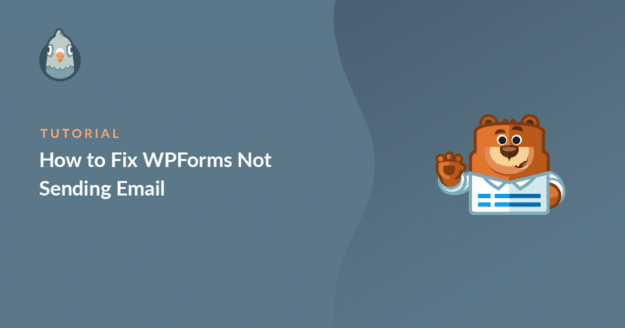AI Zusammenfassung
Sendet WPForms keine E-Mail, wenn deine Formulare abgeschickt werden?
Manchmal werden WPForms-Benachrichtigungen als Spam markiert, sodass sie nie in deinem Posteingang landen. Das ist ein häufiges Problem und viele Nutzer haben Probleme mit WordPress-Formular-E-Mails.
In diesem Artikel zeigen wir dir, wie du deine WPForms-E-Mails korrigieren kannst, damit du nie wieder eine Benachrichtigung über ein Kontaktformular verpasst.
Repariere deine WPForms-E-Mails jetzt
Warum sendet WPForms keine E-Mail-Benachrichtigungen?
WPForms sendet wahrscheinlich keine E-Mails, weil deine Nachrichten als Spam gefiltert werden. Das kann bei jedem Kontaktformular-Plugin in WordPress der Fall sein.
Es wird auch immer häufiger, dass Gmail E-Mails ohne Authentifizierung blockiert. Auch Yahoo und Outlook haben bereits strengere Regeln für die Authentifizierung eingehender E-Mails eingeführt und andere Anbieter werden folgen.
Standardmäßig fügt WordPress den E-Mails keine Authentifizierung hinzu. Wenn dein E-Mail-Anbieter also eine Nachricht von WordPress erhält, "sieht" sie aus wie eine Spam-E-Mail.
Du kannst das Problem, dass WPForms keine E-Mails versendet, ganz einfach mit dem WP Mail SMTP Plugin beheben. WP Mail SMTP übernimmt die Standardmethode zum Versenden von E-Mails und fügt die richtige Authentifizierung hinzu.
WP Mail SMTP ist einfach zu installieren und verfügt über einen Assistenten, der dir bei der Einrichtung deines gewählten Mailers hilft. Es ist eine bewährte Lösung, wenn du ein WordPress-Kontaktformular hast, das keine E-Mails versendet.
Hinweis: Einige Kunden haben Probleme damit, dass sich WPForms aufhängt, wenn das Formular abgeschickt wird. Sieh dir die Lösung für dieses Problem an, wenn du Probleme mit langsamen Formularen auf GoDaddy Managed Hosting hast.
Wie man WPForms nicht sendende E-Mails repariert
WPForms ist unglaublich flexibel, wenn es um den Versand von Formularbenachrichtigungen geht. Du kannst sogar ein Formular mit mehreren E-Mail-Adressen erstellen, an die du deine Formularbenachrichtigungen senden kannst.
Aber all diese coolen Funktionen nützen dir nichts, wenn deine WordPress-E-Mails nicht funktionieren. Die folgende Schritt-für-Schritt-Anleitung bietet Lösungen für einige häufige Probleme mit E-Mail-Benachrichtigungen in WPForms.
Wir fangen damit an, WordPress SMTP hinzuzufügen, um deine E-Mails zuverlässiger zu machen.
1. WPForms sendet keine E-Mail
Wenn es so aussieht, als würde dein Kontaktformular funktionieren, aber WPForms keine E-Mails versendet, liegt das wahrscheinlich daran, dass dein Webserver Nachrichten ohne Authentifizierung versendet.
Mit dem WP Mail SMTP-Plugin lässt sich das ganz einfach beheben. Es sendet alle deine E-Mails über einen externen E-Mail-Anbieter, damit deine E-Mails ordnungsgemäß authentifiziert werden können.
Wenn du keine E-Mails von deinem WordPress-Kontaktformular erhältst, kann die Einrichtung von SMTP das Problem beheben.
Lass es uns jetzt einrichten.
WP Mail SMTP installieren
Laden wir zunächst das WP Mail SMTP-Plugin herunter. Die neueste Version findest du auf der Registerkarte Downloads deines WP Mail SMTP-Kontos.
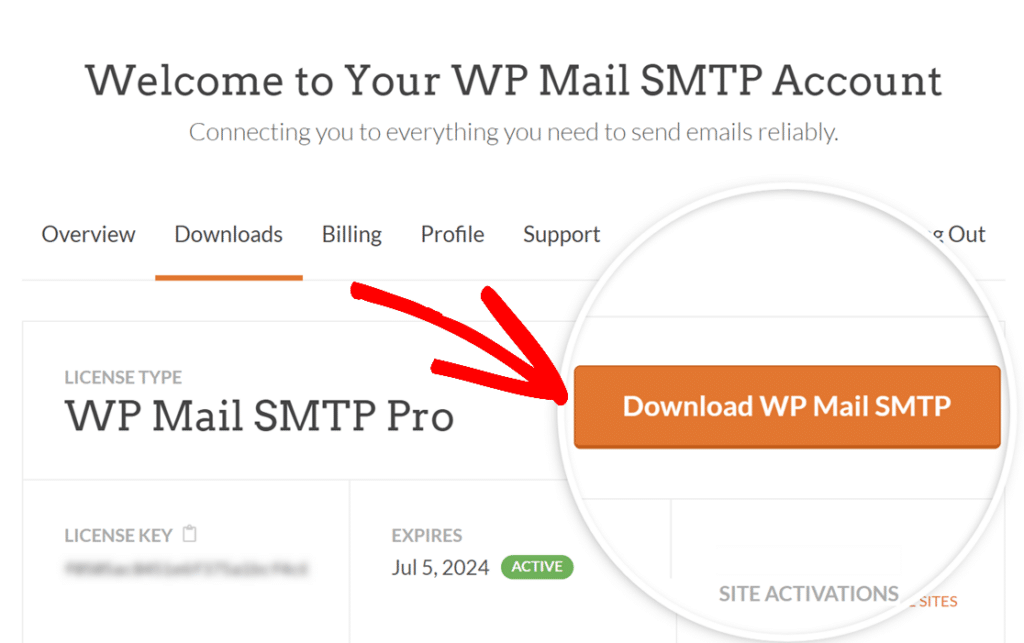
Als Nächstes lädst du das Plugin auf deine WordPress-Website hoch. Wenn du dabei Hilfe brauchst, schau dir diese Anleitung zur Installation eines WordPress-Plugins an.

Sobald du WP Mail SMTP aktiviert hast, öffnet sich der Einrichtungsassistent in deinem Browser.
Um mit der Einrichtung zu beginnen, klicke im Assistenten auf die Schaltfläche " Los geht's".
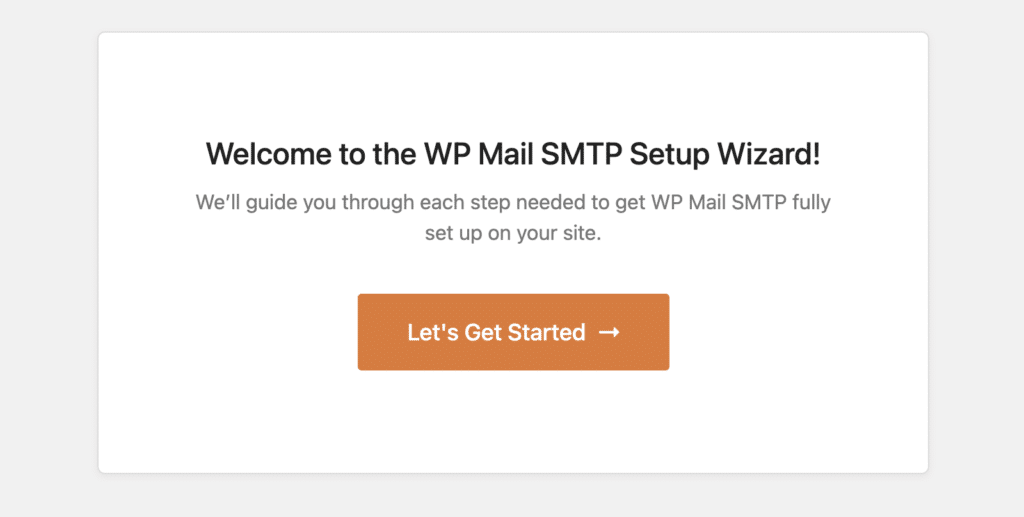
Der Assistent führt dich dann zu einem neuen Bildschirm, auf dem du die Einstellungen des E-Mail-Anbieters konfigurieren kannst, um sicherzustellen, dass deine WordPress-Formular-E-Mails ohne Probleme funktionieren.
WPForms SMTP konfigurieren
Auf dem nächsten Bildschirm siehst du eine Liste von E-Mail-Anbietern, die du in WordPress verwenden kannst.
Wir empfehlen dir, einen Anbieter für Transaktionsmails zu wählen. Transaktions-E-Mail-Anbieter sind darauf ausgelegt, große Mengen an E-Mails schnell zu versenden, und eignen sich daher ideal für die bestmögliche Zustellbarkeit von E-Mails.
Deshalb empfehlen wir, dass du dich für SendLayer, SMTP.com oder Brevo (ehemals Sendinblue). In diesem Beispiel habe ich mich für SendLayer entschieden.
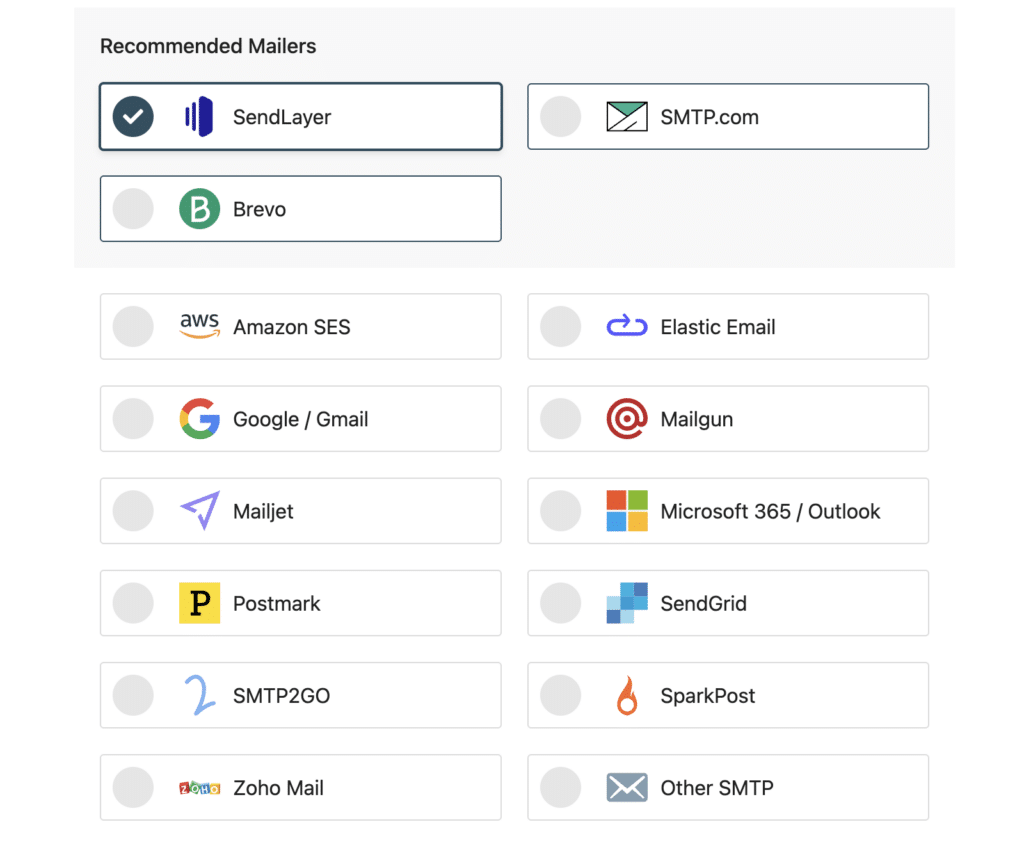
Entscheide dich für den E-Mail-Anbieter, den du verwenden möchtest.
Als Nächstes musst du dein Konto bei deinem Anbieter einrichten, falls du das noch nicht getan hast.
Klicke auf den unten stehenden Link, um die Dokumentation deines E-Mail-Anbieters zu öffnen. Dort wird erklärt, was du tun musst, um dein neues Konto mit deiner WordPress-Website zu verbinden:
| Mailer in allen Versionen verfügbar | Mailer in WP Mail SMTP Pro |
|---|---|
| SendLayer | Amazon SES |
| SMTP.de | Microsoft 365 / Outlook.com |
| Brevo | Zoho Mail |
| Google Workspace / Gmail | |
| Mailgun | |
| Poststempel | |
| SendGrid | |
| SparkPost | |
| Andere SMTP |
Mailer, Von-Name und Von-E-Mail konfigurieren
Der Assistent verlinkt direkt zu den Einrichtungsanweisungen für den Mailer deiner Wahl. Da ich mich für SendLayer entschieden habe, muss ich an dieser Stelle nur noch einen API-Schlüssel eingeben.
Auf dieser Seite musst du auch den Absendernamen eingeben, von dem deine WPForms-E-Mails kommen sollen, und die Absender-E-Mail-Adresse, von der die Formularbenachrichtigungen gesendet werden sollen.
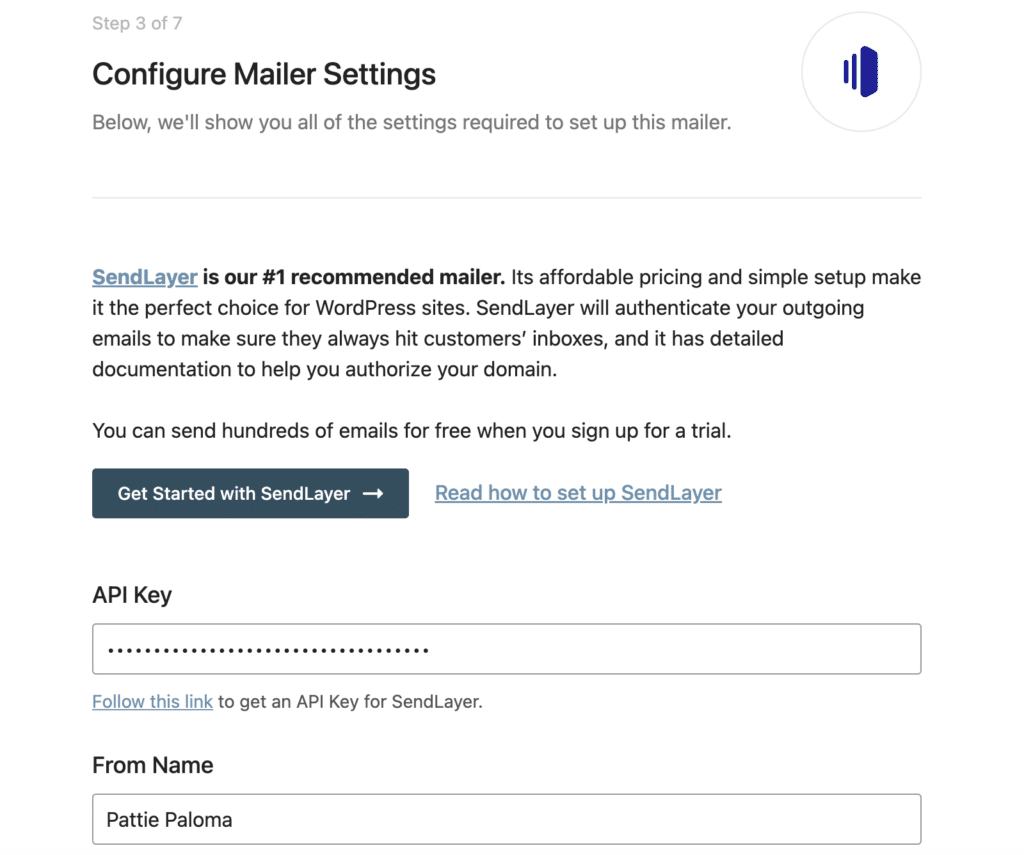
Hinweis: Achte darauf, dass du dieselbe E-Mail-Adresse verwendest, die du in deinem gewählten Mailer eingerichtet hast.
Brauchst du Hilfe?
Unsere Elite-Lizenz beinhaltet White Glove Setup für SendLayer, Brevo oder SMTP.com.
Du möchtest mehrere Mailer einrichten? Das kannst du in den Einstellungen für zusätzliche Verbindungen tun, sobald du den Einrichtungsassistenten abgeschlossen hast. Dann kannst du eine Backup-Verbindung auswählen und Smart Routing konfigurieren.
Wenn du mit den Einrichtungsschritten im obigen Dokument fertig bist, wechsle zurück zu dieser Anleitung.
Aktiviere die E-Mail-Protokollierung für WPForms
Am Ende des Assistenten werden 2 Einstellungen automatisch aktiviert:
- Verbesserte Zustellbarkeit von E-Mails
- E-Mail-Fehlerverfolgung
Wir empfehlen, dass du auch die detaillierten E-Mail-Protokolle aktivierst.
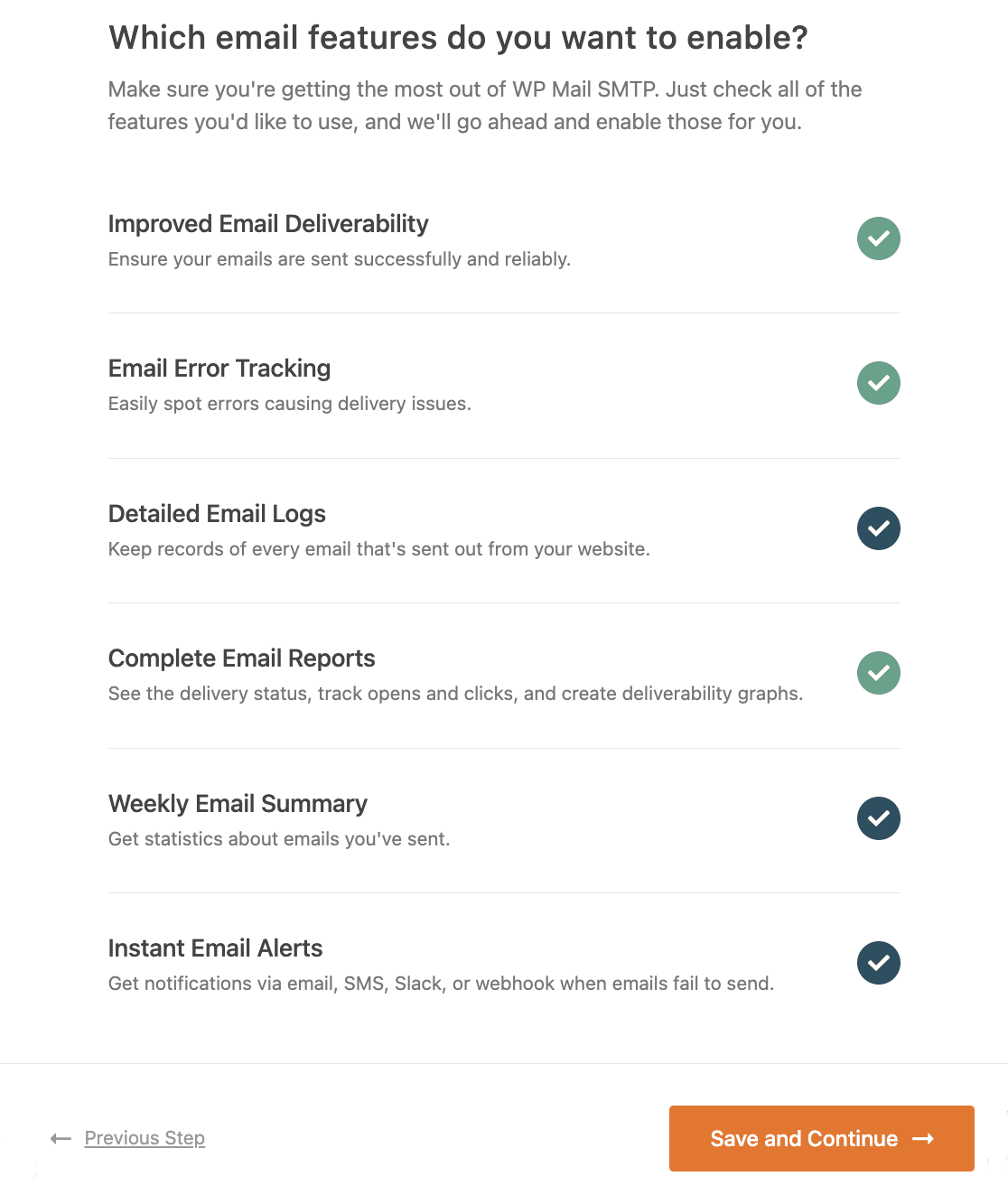
Wenn du die detaillierten E-Mail-Protokolle aktivierst, kannst du jede E-Mail verfolgen, die das Plugin von deiner Website aus versendet, einschließlich:
- E-Mail-Kopfzeilen
- Betreffzeile
- Datum gesendet
- Status
WP Mail SMTP zeigt diese Daten sowohl in den Complete Email Reports als auch im WP Mail SMTP Dashboard Widget an.
Die wöchentliche E-Mail-Zusammenfassung enthält eine Übersicht über deine E-Mail-Zustellbarkeitsstatistiken für die Woche.
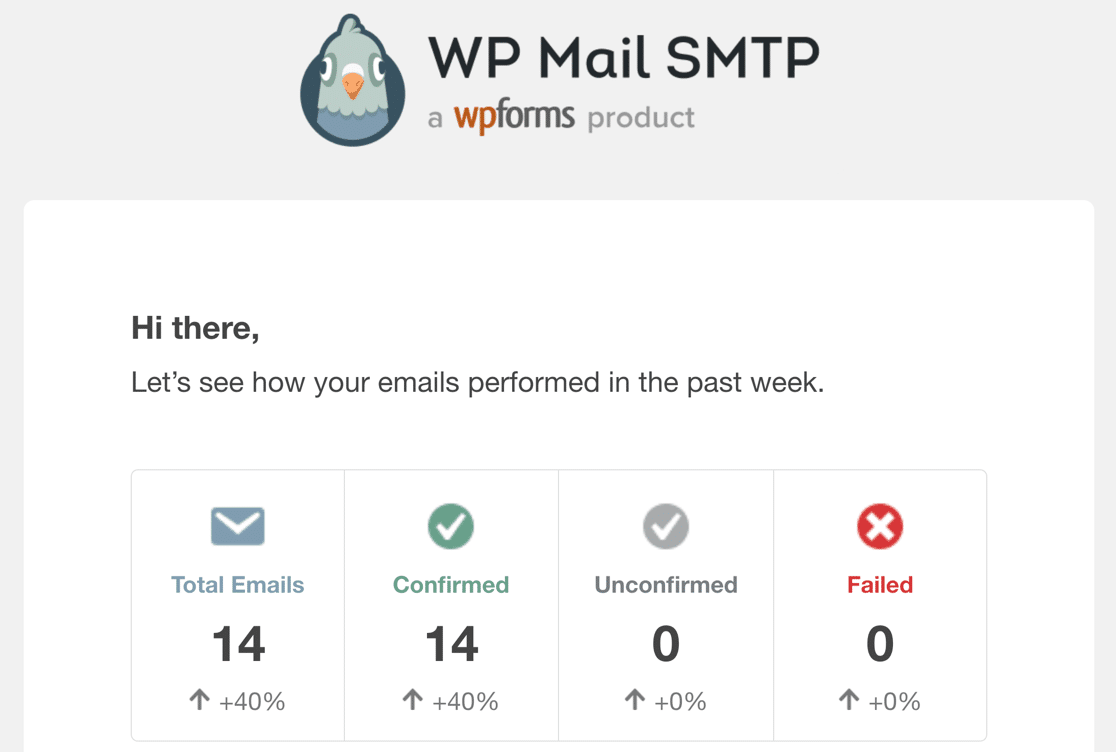
Die andere Funktion, die hier zur Verfügung steht, ist Instant Email Alerts. Wenn deine Website keine E-Mail versendet, erhältst du sofort eine Benachrichtigung darüber.
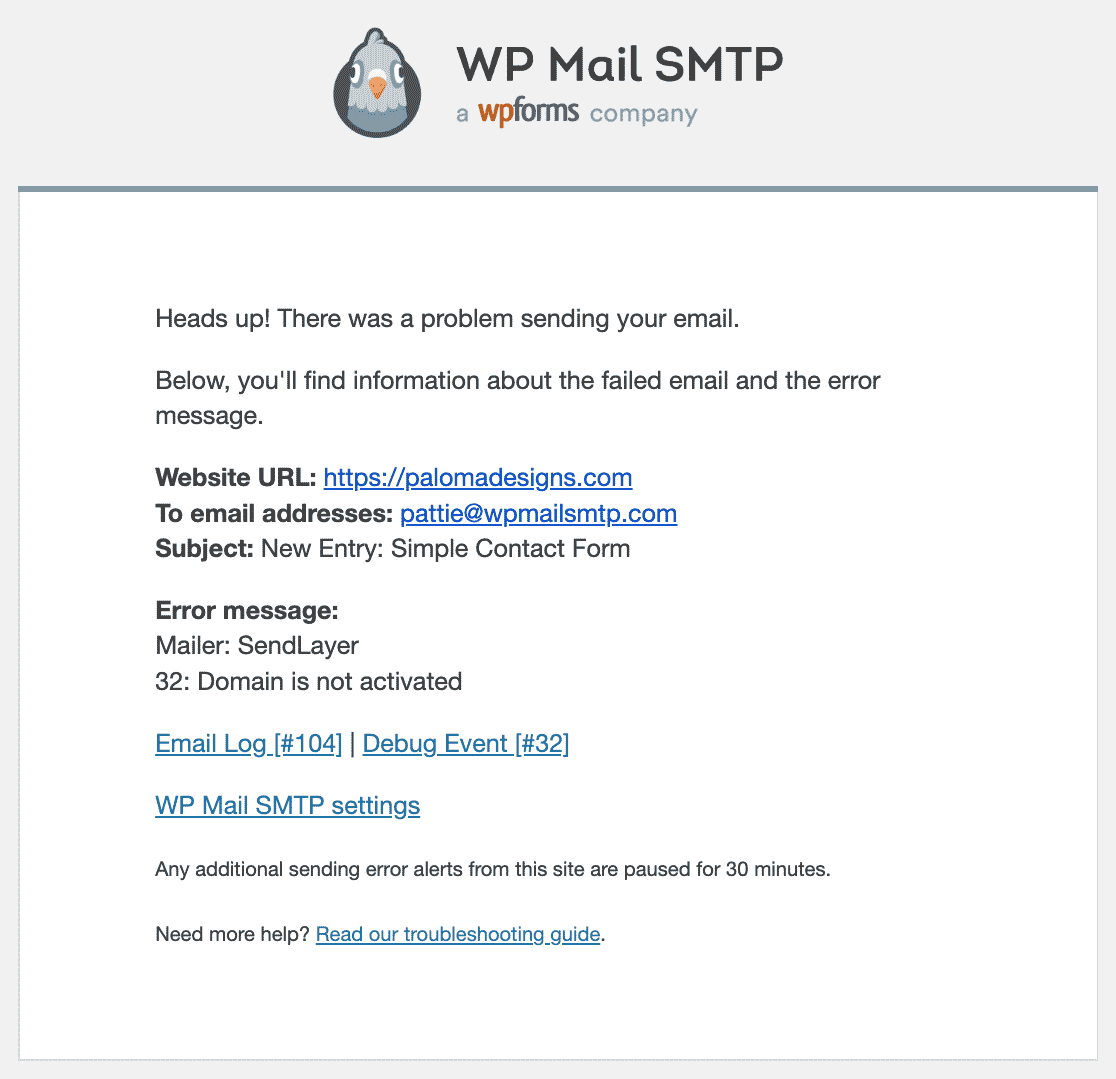
Die Funktion E-Mail-Protokolle schaltet im nächsten Schritt des Einrichtungsassistenten auch einige erweiterte Einstellungen frei.
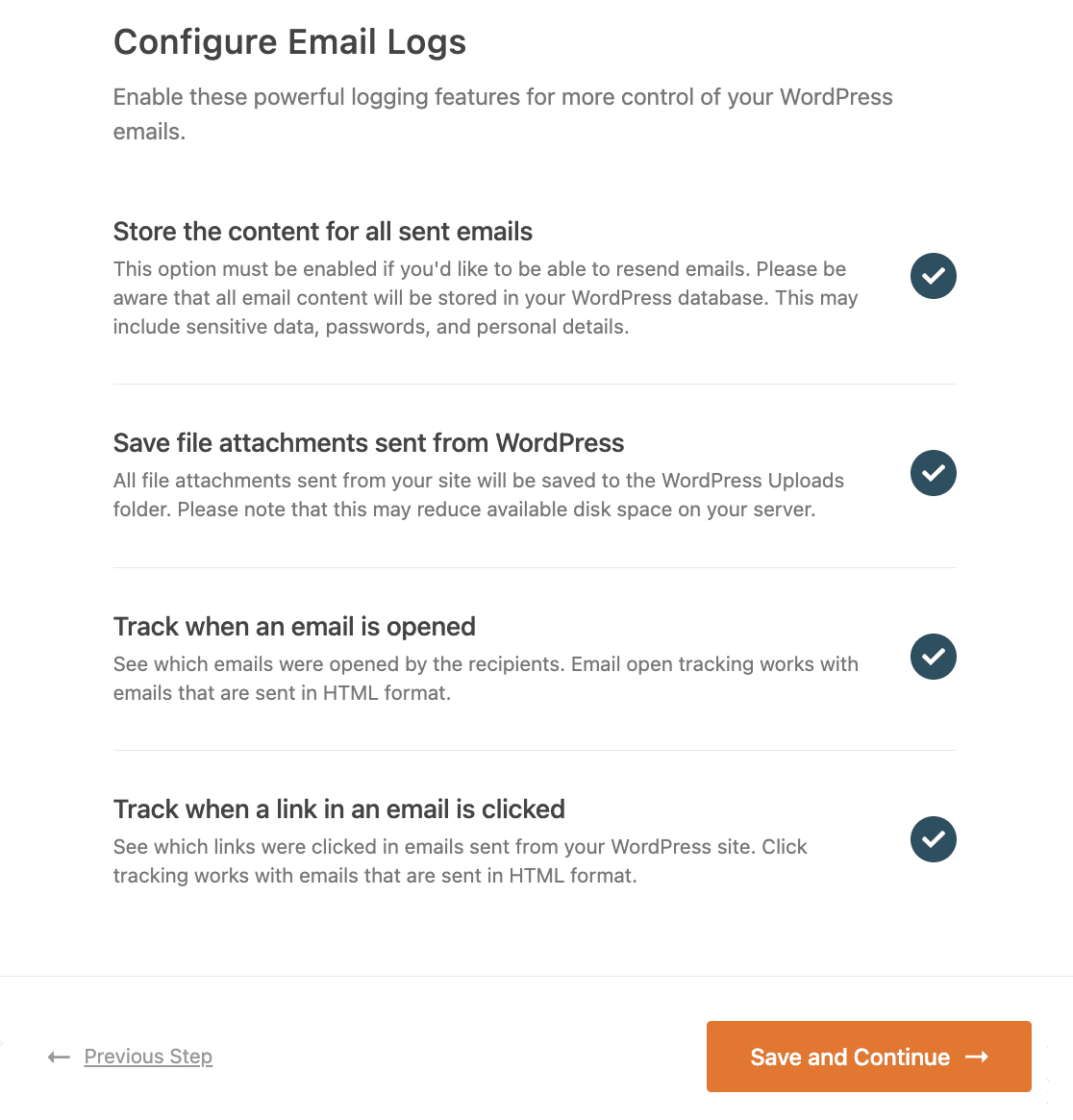
- E-Mail-Inhaltsprotokollierung: Speichere eine Kopie des Textes jeder E-Mail zusammen mit den Kopfzeilen
- E-Mail-Anhänge speichern: Speichere jeden von WordPress gesendeten Anhang
- Öffnungs- und Klick-Tracking: Sieh dir die Öffnungs- und Klick-Analysen für deine WordPress-E-Mails an .
- E-Mail-Protokolle exportieren: Exportiere die Details der gesendeten E-Mails und alle Anhänge
- Exportieren im EML-Format: Speichere eine vollständige Kopie einer gesendeten E-Mail und ihrer Anhänge
- E-Mail erneut senden: Versende fehlgeschlagene E-Mails einzeln oder in Massen - ideal, wenn du die E-Mail zur Registrierung eines neuen Benutzers in WordPress erneut versenden möchtest.
Lies unseren Artikel darüber, wie du WordPress-E-Mails protokollierst, um mehr darüber zu erfahren.
Vergiss nicht, am Ende des Assistenten deinen Lizenzschlüssel einzugeben, um alle Funktionen und Updates der Pro-Version zu aktivieren.

Die Verwendung von WP Mail SMTP behebt die meisten E-Mail-Probleme, einschließlich der Probleme bei der Benutzerregistrierung in WPForms. Hast du immer noch Probleme? Dann schauen wir uns als Nächstes deine Benachrichtigungen an.
2. WPForms-E-Mails an die falsche Adresse senden
Jedes Formular in WPForms hat seine eigenen Benachrichtigungseinstellungen. Wenn WPForms-E-Mails nicht in deinem Posteingang ankommen, solltest du überprüfen, ob du die richtigen Einstellungen für die Benachrichtigungen des jeweiligen Formulars vorgenommen hast.
Diese Schritte beheben, dass WPForms Pro oder WPForms Lite keine E-Mails versenden.
Öffne in WPForms das WordPress-Formular, mit dem du Probleme hast. In diesem Beispiel verwenden wir ein einfaches Kontaktformular.
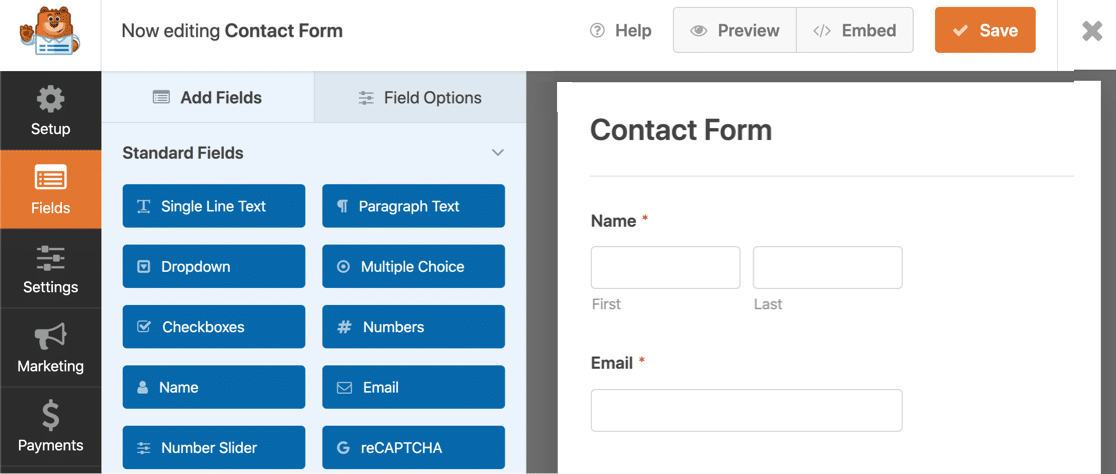
Klicke dann auf das Symbol Einstellungen auf der linken Seite des Formularerstellers.
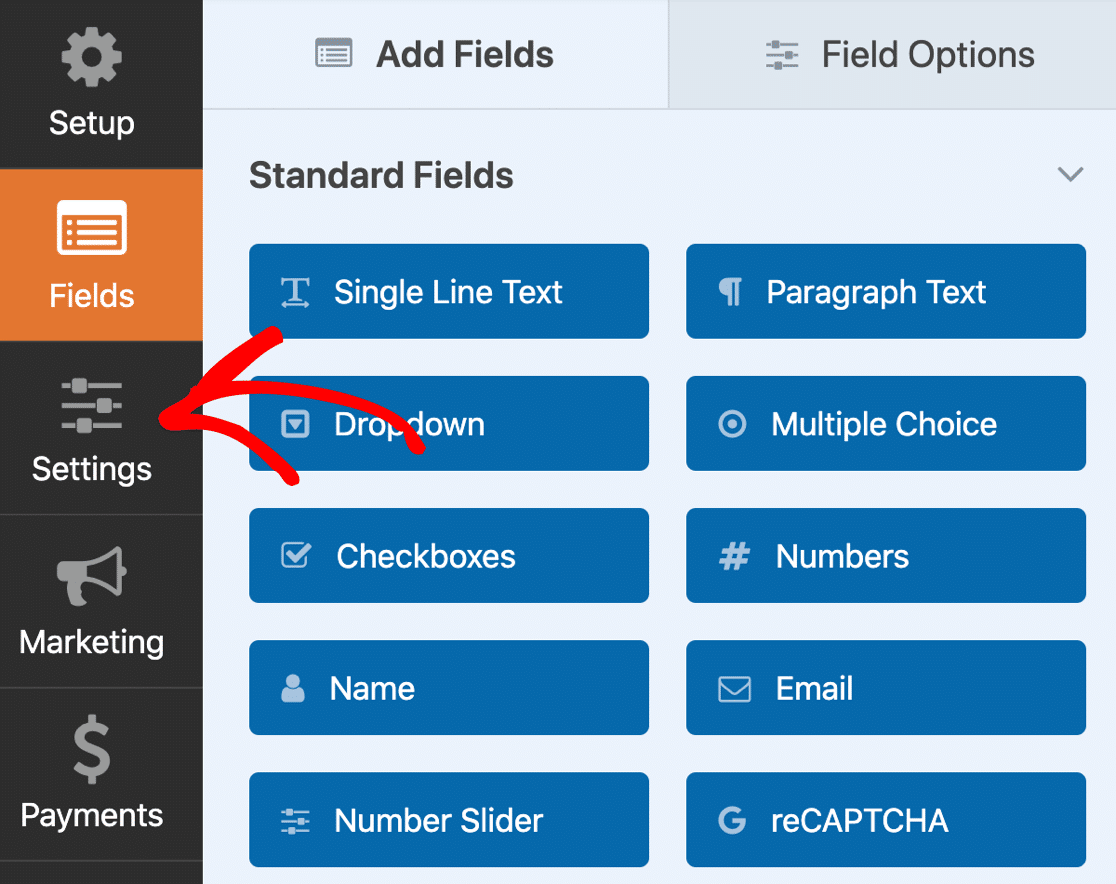
Klicke jetzt auf Benachrichtigungen, um die E-Mail-Vorlage für das Formular zu öffnen.
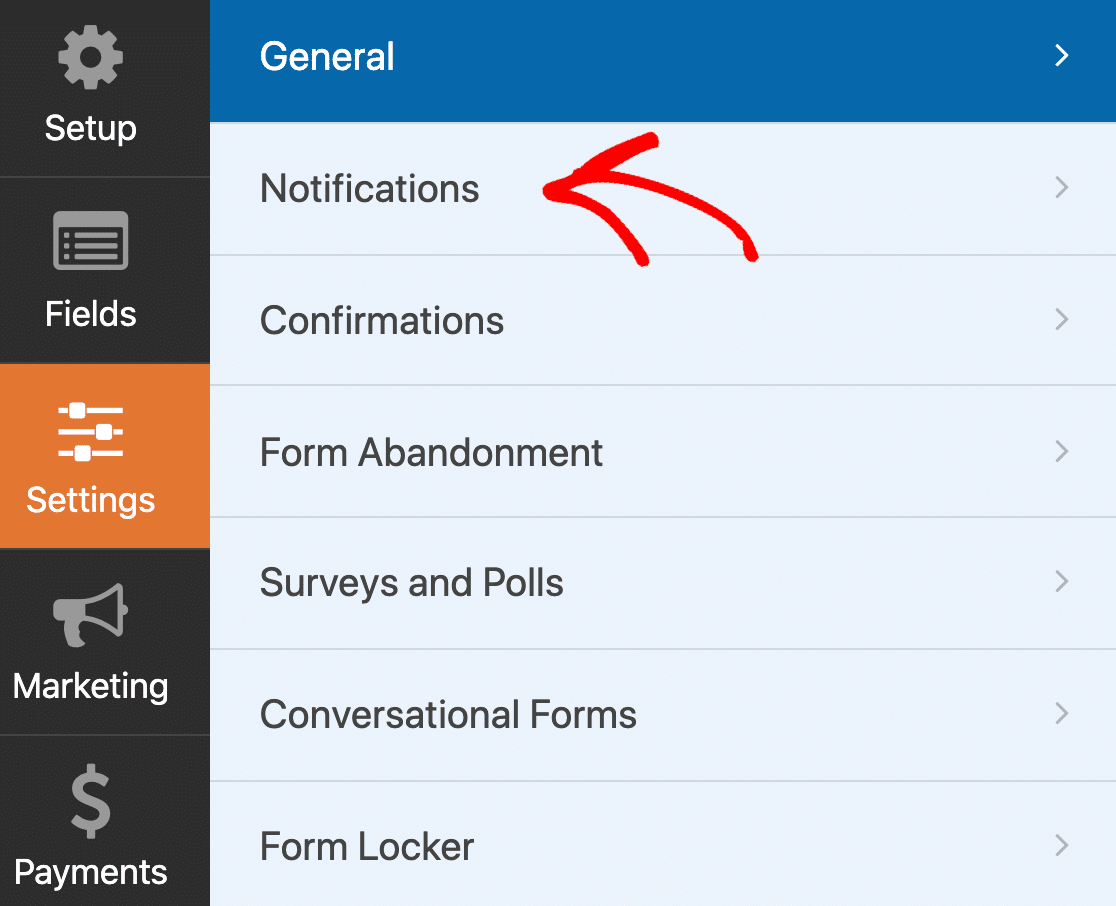
Deine Standardbenachrichtigung sieht wie folgt aus:
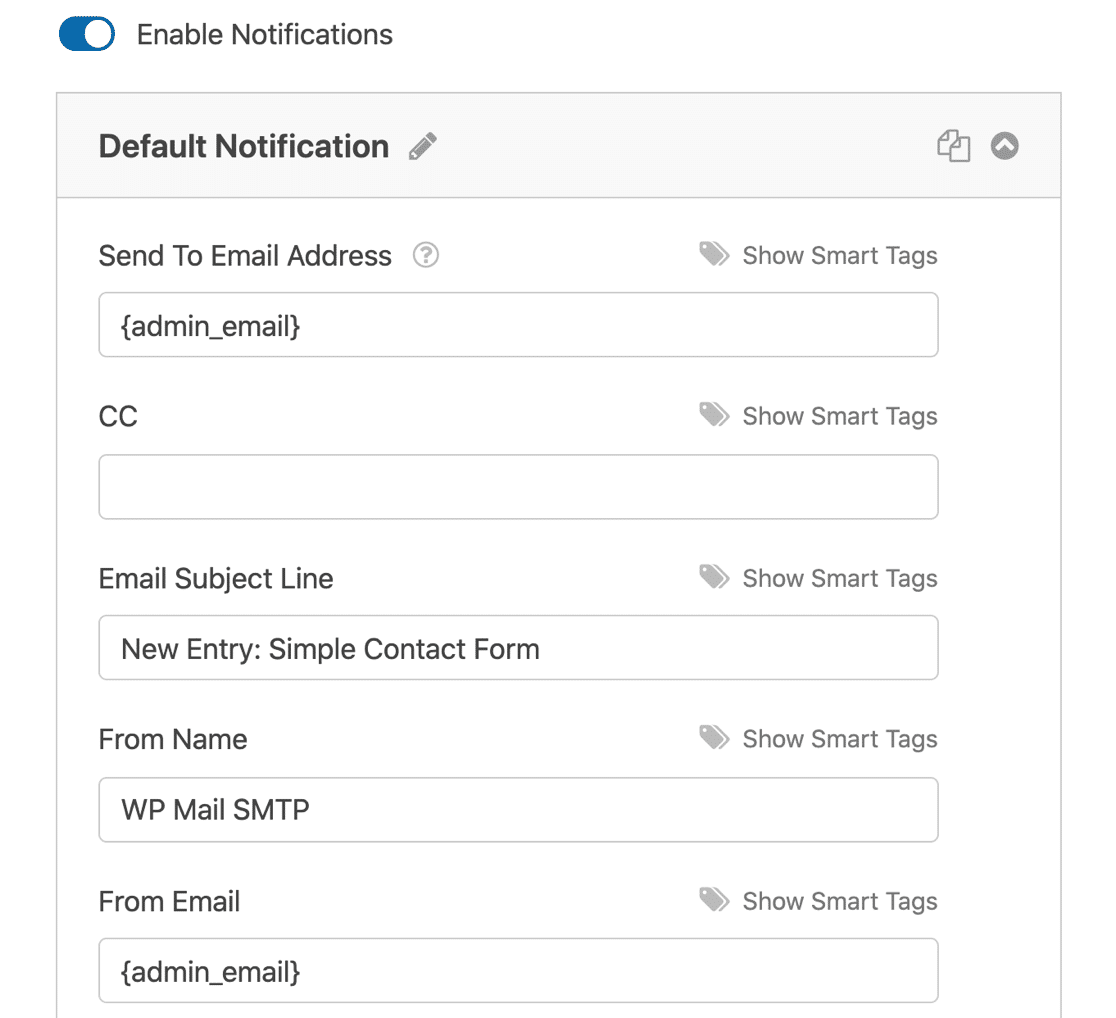
Wenn diese WPForms-Benachrichtigungen nicht funktionieren, solltest du einige Dinge in deinen E-Mail-Benachrichtigungseinstellungen überprüfen:
- Die Senden an wird auf den
{admin_email}in WordPress standardmäßig. Wenn du nicht möchtest, dass die Benachrichtigungen dorthin gesendet werden, kannst du die{admin_email}Smart Tag und gib eine andere E-Mail-Adresse ein. - Wenn du mehr als eine E-Mail-Adresse im Feld " Senden an" verwenden möchtest, musst du die E-Mail-Adressen durch ein Komma trennen.
- Die Sende- und Absender-E-Mails sollten unterschiedlich sein. So vermeidest du, dass die Warnung "Sei vorsichtig mit dieser Nachricht" in Google Mail erscheint.
Denke daran, dass es wichtig ist, eine Absender-E-Mail zu verwenden, die in WP Mail SMTP authentifiziert ist.
Wenn du die grundlegenden Formularbenachrichtigungen eingerichtet hast, klicke oben im Formularersteller auf Speichern.
Formular Abandon Notifications
WPForms hat ein Form Abandonment Addon, das unvollständige Formulareingaben erfasst. Das ist eine gute Möglichkeit, Leads von Besuchern zu erfassen, die beim Ausfüllen eines Formulars abgebrochen haben.
Wenn du diese Funktion aktiviert hast, musst du 2 Benachrichtigungen für dein Formular einrichten. Eine wird für abgebrochene Einträge verwendet, die andere für abgeschlossene Einträge.
Die Benachrichtigungs-E-Mails für verlassene Formulare werden in den Benachrichtigungseinstellungen aktiviert. Du musst ganz nach unten scrollen und die Option Für abgebrochene Formulareinträge aktivieren aktivieren:

Wenn du auch E-Mails für ausgefüllte Formulare erhalten möchtest, musst du eine zweite Benachrichtigung erstellen. Du kannst einfach auf das Klon-Symbol klicken, um eine Kopie deiner ersten Benachrichtigung zu erstellen.
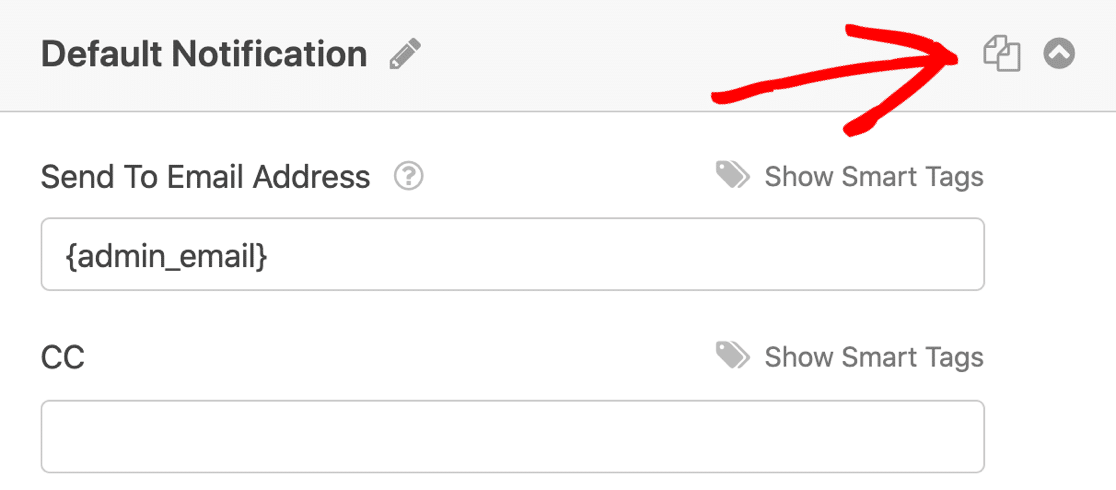
Vergewissere dich in der geklonten Meldung, dass die Einstellung Für abgebrochene Formulareinträge aktivieren deaktiviert ist.
Jetzt erhältst du 2 Benachrichtigungen für das Formular: eine für abgebrochene Einträge und eine separate Benachrichtigung für abgeschlossene Einträge.
3. Fehler in WPForms beheben
Wenn du immer noch keine WPForms-Benachrichtigungen erhältst, solltest du das Formular testen, um sicherzustellen, dass alles wie erwartet funktioniert. Probleme mit widersprüchlichen Plugins oder Themes können verhindern, dass Formulare abgeschickt werden.
Hier sind die 3 häufigsten Fehlermeldungen, die du siehst, wenn du keine E-Mails von deinen WordPress-Kontaktformularen erhältst.
WPForms hat ein Problem mit JavaScript entdeckt
Dies wird normalerweise durch Caching-Plugins verursacht, die versuchen, das JavaScript in WordPress zu minimieren. Das ist zwar für einige Teile deiner Website hilfreich, aber die Minifizierung kann deine Formulare kaputt machen, sodass deine Besucher sie nicht mehr abschicken können.
Du kannst diesen Fehler beheben, indem du die JavaScript-Optimierung in deinem Caching-Plugin deaktivierst oder die folgenden Dateien ausschließt:
- WPForms Lite:
/wp-content/plugins/wpforms-lite/assets/js/wpforms.min.js - WPForms Pro:
/wp-content/plugins/wpforms/assets/js/wpforms.min.js
Vergiss nicht, den Cache zu löschen, bevor du deine Formulare erneut ausprobierst.
Formular-Token ist ungültig
Diese Fehlermeldung bedeutet auch, dass JavaScript in deinem Formular nicht funktioniert. Wenn JavaScript nicht funktioniert, funktioniert auch das Anti-Spam-Token nicht und das Formular kann nicht abgeschickt werden.
Um dies zu beheben, befolge die oben genannten Schritte, um WPForms JavaScript in deinem Caching-Plugin auszuschließen.
Dieses Feld ist erforderlich
WPForms hat die besten Anti-Spam-Funktionen aller Kontaktformular-Plugins. Du kannst zwischen verschiedenen Anti-Spam-Tools für jedes Formular wählen. Du kannst zum Beispiel ganz einfach hCaptcha zu deinen WordPress-Formularen hinzufügen.
Gelegentlich erzeugen diese CAPTCHAs eine Fehlermeldung wie "Dieses Feld ist erforderlich", obwohl sie ausgefüllt wurden.
Wenn deine Besucher das Formular nicht abschicken können, weil sie diesen Fehler sehen, könnte es daran liegen, dass reCAPTCHA oder hCaptcha zweimal geladen wird. Dies wird durch einen Konflikt mit deinem Theme oder einem anderen Plugin verursacht.
Um dies zu beheben, deaktiviere das Plugin, das reCAPTCHA oder hCaptcha außerhalb von WPForms lädt.
Wenn du die Ursache nicht finden kannst, kannst du auch erzwingen, dass das CAPTCHA nur einmal geladen wird. Gehe dazu auf die Hauptseite von WPForms " Einstellungen:
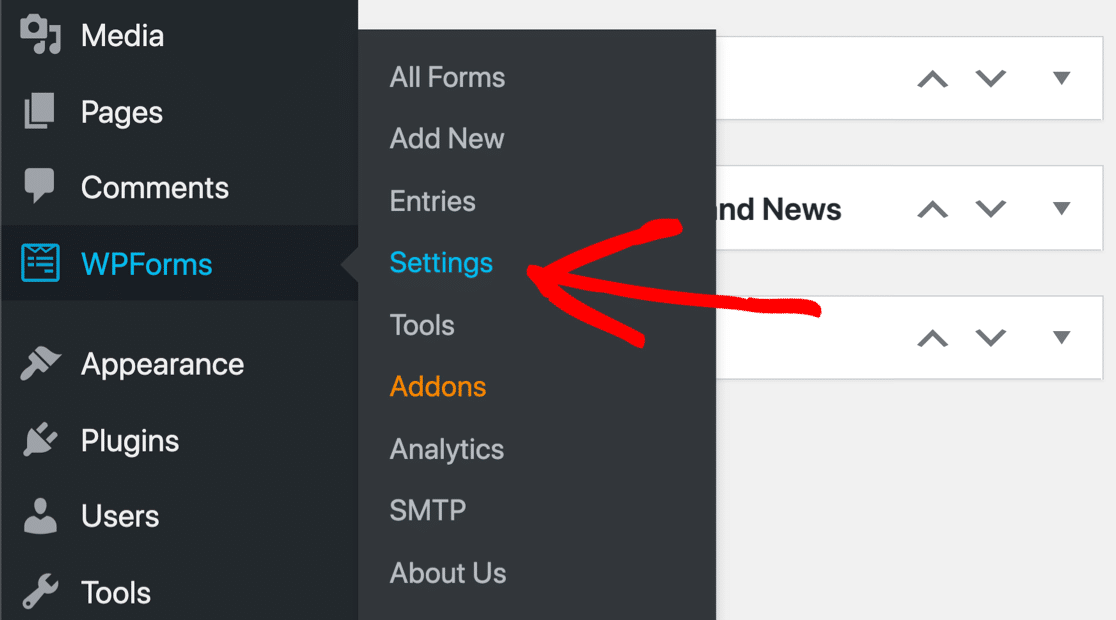
Als nächstes klickst du oben auf die Registerkarte CAPTCHA, um deine CAPTCHA-Einstellungen zu öffnen.

Klicke auf das Kontrollkästchen No-Conflict Mode, um zu verhindern, dass ein anderer reCAPTCHA-Code auf deiner Seite geladen wird.

WPForms sendet keine E-Mails an Gmail, Yahoo oder Outlook
Wenn WPForms keine E-Mails an Gmail, Yahoo oder Outlook sendet, liegt das wahrscheinlich daran, dass die E-Mails nicht authentifiziert sind. Diese E-Mail-Anbieter haben sehr strenge Filter, die verhindern, dass verdächtige E-Mails zugestellt werden. Das bedeutet manchmal, dass die E-Mail nicht einmal im Junk-Mail-Ordner auftaucht.
Um sicherzustellen, dass deine WPForms-Formularbenachrichtigungs-E-Mails Gmail-, Yahoo-, Outlook- und Hotmail-E-Mail-Adressen erreichen, musst du sicherstellen, dass die Domäne, von der du die E-Mail versendest (das ist der Teil deiner Von-E-Mail nach dem "@"-Symbol), richtig authentifiziert ist.
Nachdem du WP Mail SMTP installiert hast, stelle sicher, dass du deine Domain mit den richtigen DMARC-, DKIM- und SPF-Einträgen einrichtest.
Wenn du Hilfe brauchst, kannst du mit dieser Anleitung beginnen, wie du einen DMARC-Eintrag zum Schutz deiner Domain erstellst.
Mit der E-Mail-Testfunktion von WP Mail SMTP kannst du sicherstellen, dass deine Absender-E-Mail authentifiziert ist. Du schickst nicht nur eine E-Mail an eine E-Mail-Adresse deiner Wahl, um sicherzustellen, dass du das Plugin richtig eingerichtet hast, sondern du siehst auch, ob einer deiner DNS-Einträge nicht richtig eingerichtet ist (angezeigt durch ein gelbes oder rotes Symbol).
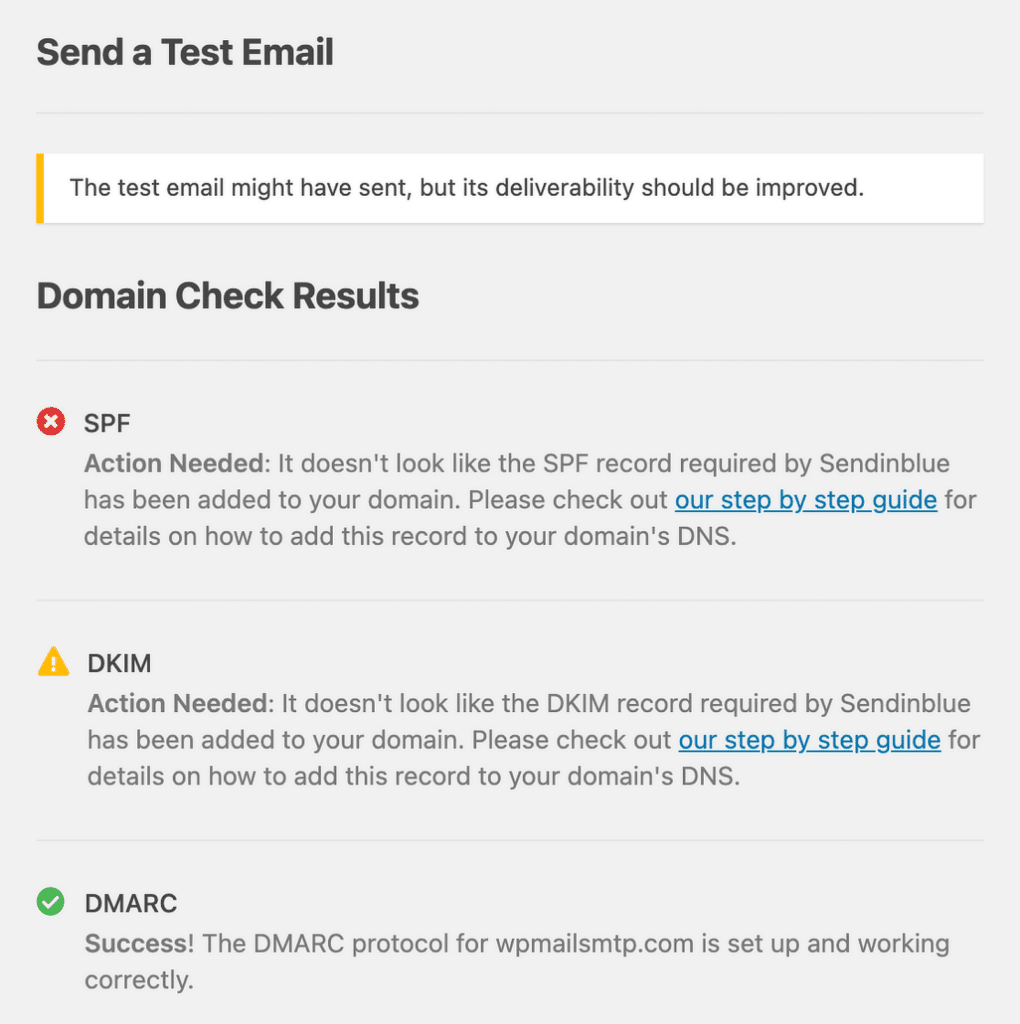
Gmail, Yahoo und Outlook verlangen nicht nur eine Domänenauthentifizierung, sondern haben auch strenge Richtlinien, um Spam-Beschwerden zu vermeiden und es den Nutzern leicht zu machen, sich von Marketing-E-Mails abzumelden. Gmail und Yahoo haben diese Beschränkungen im Jahr 2024 eingeführt, Outlook folgte 2025.
In unserem Leitfaden " Was tun, wenn Gmail deine E-Mails blockiert?" findest du genauere Anweisungen, um sicherzustellen, dass deine WPForms-E-Mails den Posteingang erreichen.
Und das war's! Du hast gelernt, wie du Fehler behebst und WPForms keine E-Mail-Benachrichtigungen sendet.
Repariere deine WPForms-E-Mails jetzt
FAQ zu WPForms sendet keine E-Mails
Hier sind einige der häufigsten Fragen, die wir zu Problemen mit ausgehenden WPForms-E-Mails bekommen.
Verwendet WPForms SMTP?
WPForms verwendet die Standard-E-Mail-Konfiguration deiner Website. Wenn SMTP also nicht auf deiner Website eingerichtet ist, verwendet WPForms PHP Mail, um E-Mails zu versenden, was die meisten Probleme mit der Zustellbarkeit verursacht.
Um WPForms dazu zu bringen, E-Mails über SMTP zu versenden, musst du WP Mail SMTP einrichten, wie oben gezeigt.
Warum schickt mir WPForms nach dem Abschicken keine E-Mail?
Der häufigste Grund, warum WPForms keine E-Mail versendet, nachdem ein Benutzer ein Formular abgeschickt hat, ist, dass deine Website nicht richtig über eine SMTP-Konfiguration verfügt.
Um SMTP zu konfigurieren und E-Mails von WPForms zu empfangen, musst du WP Mail SMTP wie oben beschrieben einrichten.
Wie kann ich E-Mail-Benachrichtigungen für mein Formular testen?
Du kannst deine E-Mail-Benachrichtigungen testen, indem du selbst einen Formulareintrag abschickst, nachdem du dein Formular fertiggestellt hast.
Das kannst du tun, während du ein Formular, das du gerade mit WPForms erstellt hast, in der Vorschau ansiehst. Sobald du einen Eintrag abschickst, solltest du eine E-Mail-Benachrichtigung über die Übermittlung des Formulars erhalten.
Wenn du keine Benachrichtigung erhalten hast, überprüfe dein WP Mail SMTP-E-Mail-Protokoll, um zu sehen, ob es irgendwelche Konfigurationsfehler gibt.
Was bedeutet "Versuch, beschädigte Beitragsdaten zu übermitteln" in WPForms?
Dieser Fehler weist in der Regel auf eine Fehlanpassung des Sicherheitstokens hin, die oft durch Caching-Plugins oder CDN-Dienste verursacht wird, die eine alte Version deines Formulars speichern.
Das Sicherheits-Token des Formulars läuft ab, aber die gecachte Version zeigt immer noch das alte Token. Um das Problem zu beheben, lösche deinen Cache (auch den CDN-Cache, wenn du Cloudflare verwendest), deaktiviere das Caching auf Seiten mit Formularen oder füge in deinem Caching-Plugin eine Ausnahmeregel für WPForms-Seiten hinzu.
Wie behebe ich, dass WPForms keine E-Mails an Gmail sendet?
Gmail hat strenge Authentifizierungsanforderungen, die WordPress-E-Mails oft blockieren. Installiere WP Mail SMTP und verbinde es mit einem authentifizierten E-Mail-Dienst.
Setze deine "Absender-E-Mail" auf deine Domain (wie [email protected]), nicht auf eine Gmail-Adresse. Aktiviere SPF-, DKIM- und DMARC-Einträge für deine Domain.
Nach der Einrichtung sendest du einen Test-WPForms-Antrag, um zu überprüfen, ob die Zustellung per Google Mail funktioniert.
Warum sendet WPForms Lite keine E-Mails?
WPForms Lite verwendet dasselbe E-Mail-Benachrichtigungssystem wie WPForms Pro, sodass E-Mail-Fehler beide Versionen gleichermaßen betreffen.
Das Problem liegt nicht an der Funktionalität von WPForms Lite, sondern am Standard-E-Mail-System von WordPress. Installiere WP Mail SMTP (funktioniert sowohl mit Lite als auch mit Pro), um die E-Mail-Zustellung für alle WPForms-Versionen zu beheben.
Kann WPForms an mehrere E-Mail-Adressen senden?
Ja, gib in den Benachrichtigungseinstellungen deines Formulars mehrere E-Mail-Adressen in das Feld "Senden an E-Mail-Adresse" ein, getrennt durch Kommas.
Zum Beispiel: [email protected], [email protected], [email protected]. Jede Adresse erhält eine Kopie der Benachrichtigung, wenn das Formular eingereicht wird.
Als nächstes solltest du dir diese Page Builder Plugins ansehen
Wusstest du, dass du jedes WPForms-Kontaktformular ganz einfach mit SeedProd einbetten kannst?
Sieh dir diese Liste der besten Seitenerstellungs-Plugins an und erfahre, wie WPForms und SeedProd die Entwicklung individueller Landing Pages erleichtern.
Wenn du mehr über WPForms und seine besten Funktionen erfahren möchtest, schau dir unseren ausführlichen WPForms-Test an.
Repariere deine WPForms-E-Mails jetzt
Bist du bereit, deine E-Mails zu verbessern? Starten Sie noch heute mit dem besten WordPress SMTP-Plugin. Wenn du keine Zeit hast, deine E-Mails zu reparieren, kannst du gegen Aufpreis eine umfassende White Glove Setup-Unterstützung erhalten und es gibt eine 14-tägige Geld-zurück-Garantie für alle kostenpflichtigen Angebote.
Wenn dir dieser Artikel geholfen hat, dann folge uns bitte auf Facebook und Twitter für weitere WordPress-Tipps und -Anleitungen.

